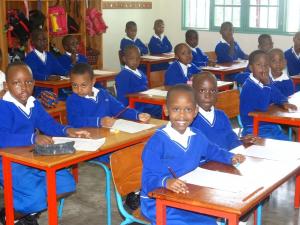
Gov’t Proposes BIA Software To Improve Quality of Education
One of the most important goals for Rwanda’s vision 2020 is the pupil’s access to high-quality education for the community to move towards a knowledge-based economy.
There are several methods expected to achieve the target, but amongst the most important ones is ‘Bridge International Academies (BIA)’ systems for nursery and primary schools.
The BIA system uses smartphone applications that require teachers to seamlessly sync their performance, attendance, pupil attendance, and performance for instructional monitoring.
These smartphones also have built software that tracks lesson pacing and pupil comprehension.
The BIA system was proposed to an extraordinary cabinet meeting chaired by President Paul Kagame on Tuesday 16, as a new tool that would achieve the quality of education in Rwanda.
BIA, wireless technology is used by teachers to deliver advanced lessons to pupils. This system (BIA) also believes that every child has a right to high-quality education.
It (BIA) was founded by Shannon May, Jay Kimmelman, and Phil Frei, educationists based in the United Kingdom to solve challenges including underprepared teachers, teachers absenteeism, ill-shaped classrooms, and teachers’ administrative errors.
The system partners with governments and communities, to train teachers, establish schools and technology tools (academies) and register pupils to start learning.
In 2009 BIA launched its first academy in Mukuru Kwanjenga in Kenya. After eight years of supposed successes. This education system expanded in Uganda, Nigeria, Andhra Pradesh, India, among others.
The twenty-two education global award winner (BIA) trains teachers on delivering life-changing lessons to children based on practical education at an early age following the education curriculum.
BIA system won global education awards including education investor in 2017, Africa game-changer of the year (education) in 2018, and girl effect award, among others.
BIA comes at the time, the Ministry of Education is working around the clock to improve the quality of education in public and government-aided schools.
According to REB, 37.5% of pupils aged 15-17 are still in primary schools, the issue caused pupils who fail promotional exams and repeat classes or those that start school at a late age.
Quality of education was among the items to discuss on the agenda of 17th National Dialogue Umushyikirano Council, December 19,2019.
